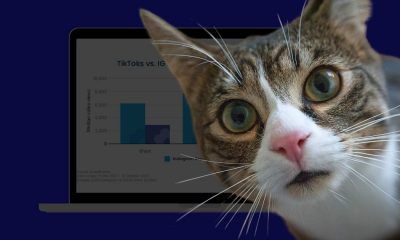SOCIAL MEDIA NEWS
Forget law school, these kids want to be a YouTube star
[ad_1]
Teen YouTuber Annie LeBlanc
Jessica Spohr
Annie LeBlanc got her first job at 6 years old.
For eight years, she’s posted YouTube videos featuring gymnastics, original songs and various tutorials, amassing subscribers and building a loyal following of almost 3.7 million fans, LeBlanc told CNBC.
She’s part of a generation of kids who want to be YouTubers when they grow up.
In fact, one-third of kids between the ages of 8 and 12 aspire to be either a vlogger or a YouTuber, according to a recent survey conducted by Harris Polls and iconic Danish toy maker Lego.
It’s part of a growing trend that stems partly from increased access to technology at younger ages, said Pam Moore, a social media expert and CEO of Marketing Nutz in Orlando, Florida.
Location matters
The study, which polled thousands of kids in three countries – the U.S., China and the United Kingdom — found that the number of kids who want to be YouTubers depends on what part of the world they come from.
Out of 1,000 kids surveyed in the U.S., 29% wanted to make it in vlogging. Kids from the U.K. gave a similar response rate, with 30% choosing a career via YouTube. Vlogger/YouTuber was the most selected career choice in both the U.S. and U.K. results. In China, by contrast, only 18% of surveyed kids said they’d want to be a vlogger.
More from Personal Finance:
How your kid could get more college aid
Parents fight urge to overspend on back-to-school
Nine colleges that charge students nothing at all
U.K. travel company First Choice conducted a similar survey in 2017 that showed a combined total of 52.3% of 1,000 surveyed kids from age 6 to 17 years old wanted to become either a vlogger, a blogger or a YouTuber.
Katherine Chen, an associate professor of sociology at the City College of New York and the CUNY Graduate Center, said the Lego survey may show that the type of exposure in each country may influence kids’ career picks.
Making relationships
Kids, she told CNBC, are influenced by their surroundings and the way they’re socialized. Young people are “more exposed to YouTube influencers right now,” she said. “Children may learn about an occupation because of what they’re taught in school or in other kinds of influences and relationships.”
And relationships may be more easily formed with YouTubers, who act as influencers to kids trying to break into vlogging. A Think with Google analysis found that 70% of teenage subscribers said they can relate more to YouTubers than to traditional celebrities.
For many kids, one of the people they interact with the most every day is their teacher, but class sizes in public primary schools can range anywhere from 21 to 26 children.
NICHOLAS KAMM | AFP | Getty Images
“Schools are so packed nowadays that people can’t connect with people,” said social media expert Moore. “So you have these huge influencers in the industry giving kids thoughts. I’ve never heard my son quote his teacher — ever.”
One surprising finding from the First Choice survey was that today’s young would-be vloggers and YouTubers are not primarily motivated by money, despite the potential for big paychecks.
On average, advertisers pay $0.18 per view, and Google keeps 45% of the amount that’s ultimately made. But if they have the subscribers and the views — like LeBlanc, whose videos frequently garner millions of views — YouTubers, even at young ages, can make serious cash.
Serious money
Over the last month, LeBlanc has made nine videos on YouTube, averaging roughly 807,890 views per video. That means she could have made up to $80,000 just in one month alone – and that’s on the lower end. The videos on LeBlanc’s professional YouTube account – where she is known by her real name –frequently hit or surpass 1 million views. Still, other YouTubers can earn as much as $22 million a year, as popular account Ryan ToysReview earns, according to Forbes.
Schools are so packed nowadays that people can’t connect with people. So you have these huge influencers in the industry giving kids thoughts.
Pam Moore
CEO of Marketing Nutz
LeBlanc got into vlogging on YouTube at age 6, she said, when her mom put up videos of her competitive gymnastic routines. Today she’s using her YouTube account to showcase her singing and acting.
“For seven to eight years, I considered myself a full-time vlogger,” she said. “But now that I’m beginning to work more on Nickelodeon and acting, as well as focusing more on my music, I have to take a little step back from vlogging full-time so I can practice and hone my craft in both of those areas.” Nickelodeon tapped LeBlanc to do a digital series called “Annie vs. Hayley” in May.
The new babysitter
Within the last eight years, there have been more kids hopping on the vlogging bandwagon – and with advanced technology such as iPads and newer iPhone models easily accessible to them, it’s easier than ever to get involved, according to Moore.
“YouTube became the new babysitter,” she said. “So many kids are missing that parental guidance and education, and American school systems are letting them down, as well.
“They don’t educate them on career opportunities or maybe [kids] see their parents struggling at careers and they see YouTube as a way out,” Moore said.
And what about parents who do care, and may very well have concerns about their kids being online so much? Responding to privacy concerns in 2017 and 2019, YouTube chose to shut off comments on videos featuring children to avoid predatory behavior such as sexualizing language.
Weekly advice on managing your money
Get this delivered to your inbox, and more info about about our products and services.
By signing up for newsletters, you are agreeing to our Terms of Use and Privacy Policy.
The decision to block all comments came after the discovery of a pedophile ring, whose members circulated videos of young girls exercising, dancing or doing gymnastics. YouTube also launched an AI moderator that is better able to pick up on and delete predatory comments.
Privacy concerns
Annie’s channel, however, gives users the ability to comment, which may indicate that YouTube has reversed this decision in the few months it’s been enforced.
“YouTube policy states that it requires minors to have an adult in the room when livestreaming, ” Moore said. “However, I have no idea how they will ever properly be able to control or monitor this.”
Privacy is a common concern among parents of YouTubers, according to Moore, but at the end of the day, it’s up to them to protect their kids and monitor what they’re posting. “YouTube is just a medium,” she said. “Most parents wouldn’t let their kids hang out all night at a dark park with strangers.
“The same should go for online,” Moore added. “Know what they are doing, who they are hanging out with and what they are talking about and why.”
[ad_2]
Source link













